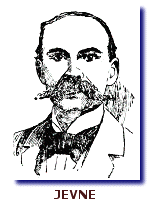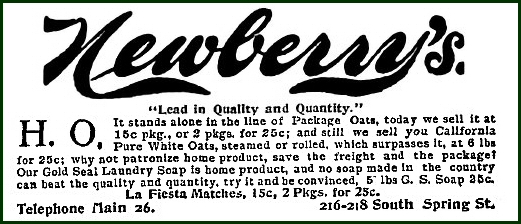Thursday, August 16, 2007
Page 11
REMINISCING (Column)
M & M Procures Housewives’ Signatures on ‘Loyalty Oaths’
By ROGER M. GRACE
The Merchants’ and Manufacturers’ Assn. of Los Angeles sought the signing of loyalty oaths.
No, this isn’t an episode from the days of communist infiltration. We’re still back in the late 1890s.
Consumers—housewives in particular—were asked to sign a pledge that they would buy “home products”...that is, locally produced goods...whenever such products were competitive with those from other places.
The Home Products Exposition in Los Angeles, held at Hazard’s Pavilion from Jan. 16-Feb. 6, 1897, was the site of mass pledge-collecting.
The approach was suggested to the M & M by its counterpart in San Francisco which had gathered 15,000 pledges during an exhibition in September, 1896.
The “loyalty oath” used in Los Angeles read:
“I hereby pledge myself, price and quality permitting, to give the preference to articles of California manufacture or production in everything that I purchase or use, and will endeavor to induce others to do likewise, and thus assist home industry.”
The M & M later dispatched cadres of female spokespersons to go door-to-door, seeking to convince homemakers of the advantages of patronizing home industries, and to procure their signatures on the pledges.
At the July 26, 1897 meeting of the M & M Board of Directors, held in the association’s offices in the Wilcox Building, this recommendation of a committee was unanimously adopted:
“In order to make the work more effective, and to reach the very sources that are expected to produce the desired results, competent women may be employed to visit housekeepers, and to point out to them the general benefits that will follow rigid adherence to the principle of patronizing home industry. These women will not be allowed to solicit trade for any article, but will be instructed to talk only on the subject from a general stand-point.”
An Oct. 16 article in the Times reports that the start of the effort would come in “a few days.”
The article tells how a housewife “sufficiently interested in the success of the movement” would be given blank pledges, and if she could get 25 of them signed, she would become president of a “home-products club.”
Once 25 of the clubs were started, the presidents would be called together and would comprise an executive committee and would “be given further charge of the work.” Upon opening of a permanent “home products” exhibition hall (which was in the offing), the executive committee members would be the beneficiaries of entertainment and lectures. While the overall campaign to promote local goods was a success, the plan to form home products clubs fizzled.
Some merchants got behind the effort to promote the
buying of home products. Here, for example, is an ad for
Newberry’s grocery store which appeared in the Times on April 1, 1897:
|
|
Newberry’s was located just two
doors to the south of the competing H. Jevne Company (original occupant of the
space now housing MetNews operations). Its proprietor, Hans Jevne, a prominent
civic leader—spotlighted in a previous series of columns—was not involved in
the “home products” movement. While he donated a prize for the baby contest
that took place during the exposition, there was no Jevne booth to show off
products he manufactured (such as bread and olive oil).
previous series of columns—was not involved in
the “home products” movement. While he donated a prize for the baby contest
that took place during the exposition, there was no Jevne booth to show off
products he manufactured (such as bread and olive oil).
Jevne, though a local producer of products, was also a major wholesaler and retailer of goods from the East Coast...as well as delicacies from countries abroad, including his native Norway.
In 1897, he was a member of the Committee of Thirty which ran La Fiesta de Los Angeles, was a city delegate to a state Pure Foods Congress in San Francisco, was an active supporter of the M & M’s WPA-style project in Elysian Park which provided jobs to the impecunious, and was on the Finance Committee of the Board of Trade as well as a joint committee of the M & M, Chamber of Commerce, and Board of Trade that was seeking the proper cleaning of city streets.
But Jevne was one civic leader who, on the subject of consumers restricting their purchases to “home products” (when feasible), was mum. And it is a sure bet that his wife, Mina, did not sign the M & M’s loyalty oath.
Copyright 2007, Metropolitan News Company
